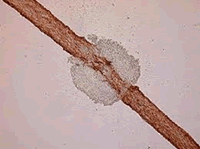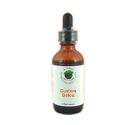|
|
Trichosporon
 |
Trichosporon species are widely distributed in nature. Species have been isolated from a wide range of substrates including: human hair (shown in photo), soil, cabbages, cheese, scarab beetles, parrot droppings, and sea water. Trichosporon is also a commensal (normally found) in the human gastrointestinal and respiratory tracts. Recognized as the cause of superficial infections such as white piedra (a distal infection of the hair shaft), the genus is now the second most commonly reported cause of disseminated yeast infections in humans.
Trichosporon species are increasingly recognized as a cause of systemic illness in immunocompromised patients. Hematologic malignancies are the best-described risk factors for trichosporonosis, accounting for 63% of reported cases. Additional risk factors include: corticosteroid use, hemochromatosis, deficiencies of granulocyte function, and end-stage renal disease.
These risk factors may work in conjunction; for example, chemotherapy used to treat hematologic malignancies can cause neutropenia and mucosal disruption. Trichosporon peritonitis is described in association with peritoneal dialysis catheters. This is likely related to the combination of disrupted barrier immunity and immune dysfunction due to end-stage renal disease.
|
|
|
 Arthropod/Vector
Bacteria
Chemicals
Fungus /Mold
/ Yeast Metals Parasites Virus Other
Arthropod/Vector
Bacteria
Chemicals
Fungus /Mold
/ Yeast Metals Parasites Virus Other



